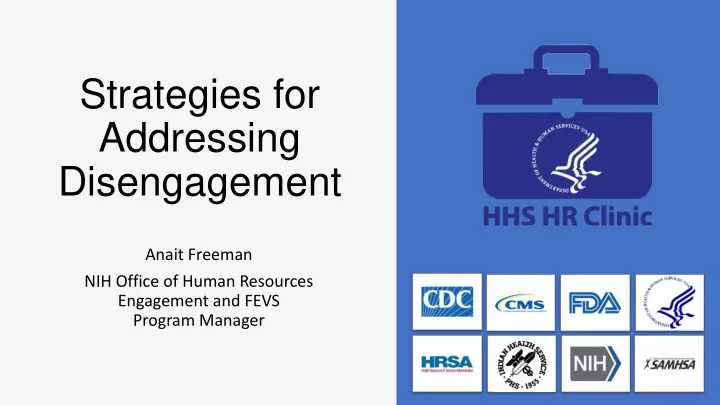

Strategies for Addressing Disengagement Anait Freeman NIH Office of Human Resources Engagement and FEVS Program Manager
Employee Engagement An employee’s sense of purpose that is evident in their display of dedication , persistence and effort in their work or overall attachment to their organization and its mission (U.S. Office of Personnel Management) 4/2/2018 Strategies for Addressing Disengagement 2
Employee Engagement is more than: • Employee Satisfaction • Only satisfied with job, not necessarily engaged • Extent to which they feel the company meets their expectations • Employee Happiness • May be happy, but not necessarily working hard and productively on behalf of the organization 4/2/2018 Strategies for Addressing Disengagement 3
Profile of an Engaged Employee • Do their best • Feel stretched beyond their comfort zone • Take personal satisfaction in their quality of work • Sometimes find work stressful, but rewarding and fun • Love their job! 4/2/2018 Strategies for Addressing Disengagement 4
Herzberg Two Factor Theory Motivators Hygiene Factors (extrinsic) (intrinsic) Challenging work Company policy Recognition Supervision Responsibility Employee's relationship with their boss Opportunity to do something meaningful Work conditions Involvement in decision making Salary Sense of importance Relationships with peers Personal growth Job security 4/2/2018 Strategies for Addressing Disengagement 5
Employee Engagement Drivers Personal Contextual Characteristic Factors Organizational Climate Job Characteristics 4/2/2018 Strategies for Addressing Disengagement 6
Why Engagement Matters RECRUITMENT Engaged employees recommend workplace to other high performers RETENTION Engaged employees are 87% more likely to stay with the organization PRODUCTIVITY Engaged employees are 22% more productive than less engaged colleagues FEWER ACCIDENTS 70% fewer safety incidents and 48% fewer patient safety incidents COMMITMENT At NIH 97.6% of respondents are willing to put in the extra effort to get the job done 4/2/2018 Strategies for Addressing Disengagement 7
Manager’s Role Setting policy Communication Relationships Feedback Organizational Justice Development and Growth 4/2/2018 Strategies for Addressing Disengagement 8
Mechanisms to Increase Engagement • Communication • Growth/Training • Recognition • Exploring Job-fit • Empowerment/Autonomy • Performance Management 4/2/2018 Strategies for Addressing Disengagement 9
Employee’s Role Customize Job-Fit Find meaningfulness Performance management Ability to be transparent 4/2/2018 Strategies for Addressing Disengagement 10
Benefits of Performance Feedback Understand Learn and Understand Receive what your improve your recognition supervisor(s) Identify upon new contribution and expects and opportunities skills, to the office appreciation what they are for growth including and agency for strong looking for on leadership mission performance a daily basis skills 4/2/2018 Strategies for Addressing Disengagement 11
Supervisory Resources • Employee Engagement Intranet • New Employee Onboarding • Stay Interview Guide for Supervisors • Giving & Receiving Feedback • Employee Recognition Assessment • Developmental Resources o IDP Consulting o Training Center Courses o Developmental Opportunities by Role o Developmental Ideas for IDP • Transition Planning Interview Guide • Performance Issues o Tips for Supervisors - Effective Communication o Tips for Supervisors - Seven Performance Management Tips 4/2/2018 Strategies for Addressing Disengagement 12
Employee Resources Work and Employee Family Life Assistance Center Program NIH Ombudsman Office 4/2/2018 Strategies for Addressing Disengagement 13
Anait Freeman Contact Information NIH Office of Human Resources FEVS and Engagement Program Manager anait.freeman@nih.gov 301.594.0550 4/2/2018 Strategies for Addressing Disengagement 14
Recommend
More recommend